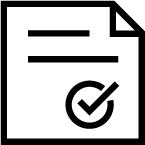Embedding digital ethics and responsibility in your company for the long term
Digital transformation and ESG are the megatrends of our time and are setting the corporate agenda. Decision-makers who want to act responsibly increasingly need to extend these duties to the digital realm. The concept of digital ethics provides companies with a moral compass for approaching digitalisation responsibly. But how do you actually go about sustainably embedding digital ethics and corporate responsibility into a company?
Our position paper addresses this question. The publication combines our expertise in the field of Digital Ethics & Responsibility with the knowledge gleaned from discussions with international pioneers of the business world. On this basis, we have put together good practices and recommendations.

How we see Digital Ethics & Responsibility

Digital Ethics involves strategic orientation, striving to do the right thing in digitalisation; Digital Responsibility requires companies to act in accordance with social, environmental and economic sustainability standards. What a company considers “the right thing” will depend on its defined corporate values, which may in turn depend on what is understood to be “moral” in the company’s geographical, social and cultural context.
Your expert for questions

Daniela Hanauer
Partner, ESG and Risk Consulting at PwC Germany
Tel.: +49 151 1172-0054
E-Mail
From vision to operationalisation to implementation
For an effective, long-term anchoring of Digital Ethics & Responsibility, we recommend using a Target Operating Model (TOM) for visioning, operationalisation and implementation. The TOM can be used to show how companies are organised to pursue their corporate purpose. This not only makes the implementation easier to understand for practitioners , but also provides a generic format that can be transferred to any industry and company type or size.
The first step is to develop a strategic orientation. The focus here is on answering the question “how do we want to act?” The strategy is then operationalised within the corporate structure or in governance, by asking “how can we achieve our intended actions?” The aim in this step is to determine which functions need to be anchored in Digital Ethics & Responsibility, how these are to be measured and which competencies are required. The third and final step concerns the actual implementation: “How do we live our intended actions?” When it comes to people and technology, it is important to develop an approach for embedding Digital Ethics & Responsibility into the foundations of decision-making and to then establish it in organisational processes.
The foundation: values-based positioning
Our discussions with companies clearly showed that established principles are a proven formula for determining a strategic orientation and values-based behaviours, and for communicating them effectively to employees and third parties. Once the company’s strategic alignment is in place, the first essential step is complete. For the vision to become a reality, however, it is necessary to transfer it into the organisational structure.
Clear rules and contacts
The companies interviewed for this study recommend proactively developing your own guidelines – and not waiting for everything to be enshrined in regulations. After all, the challenge here is that new laws are often only enacted retrospectively and usually do not take effect until some time after technological innovations have become established.
And this is playing out in practice: the regulatory landscape around Digital Ethics & Responsibility is only just beginning to grow. Many regulatory challenges have been identified and will need to be addressed in the future. Existing laws have primarily dealt with data protection, while proposed laws are mainly set to address artificial intelligence (AI) and digital services.

The question of responsibility
The companies surveyed agree that commitment is needed from every employee when it comes to Digital Ethics & Responsibility. While there should be a central point of contact where experts can be consulted, what ultimately matters is the behaviour of all employees.
“It is not necessary for every employee to become an IT and data expert for a responsible digital transformation. More health and safety will result from an appropriate awareness of and alertness for Digital Ethics & Responsibility – the ‘know-why’.”
Using technology to put people first
Even though digital transformation can give the impression that it’s all about technology and machines, our focus is on the human aspect. If you follow this premise and put people first, technical innovations are no longer about inspiring people with more powerful and flashy machines and tools, but about innovations and inventions that make the lives of customers and the work of employees easier.
Measures such as central quality controls can be introduced to effectively implement people-focussed behaviours in a company. These allow you to ensure compliance and make the subject relevant. This doesn’t necessarily require completely new processes; existing processes can often be built on instead.
Our publications on Digital Ethics & Responsibility

Digital Ethics & Responsibility: embedding digital transformation in your company for the long term
We experience it all around us every day: technologies are replacing services, decision-making and human perception. Companies need to be asking themselves how technology impacts society, the human psyche, the finite resources of our planet and our legal, financial and economic systems. Our position paper aims to help you overcome the challenges of digital ethics.

Checklist: a quick overview of how to anchor Digital Ethics & Responsibility in your company
What does Digital Ethics & Responsibility actually mean for your company? How do you go about operationalizing a strategy within your company? Our checklist sets out five steps for successfully anchoring Digital Ethics & Responsibility.
“Many companies have recognised that people are at the centre of digitalisation. Ethical and responsible digital behaviours should be anchored in corporate strategy, and operationalised in the organisation in a measurable and sustainable manner. In doing so, it is important to address both external and internal stakeholders.”
Contact us







